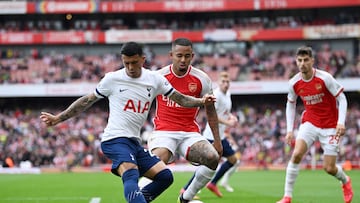SOCCER
Tottenham vs Arsenal: why is it the biggest derby in London?
Arsenal will remain top of the Premier League table regardless of the result between West Ham and Liverpool but must beat Tottenham to keep their title charge on track.

Where does the North London Derby rank in terms of soccer’s greatest rivalries? If you’re from North London, and either a Spurs or an Arsenal fan, you’ll probably have it at the top of the list. Heading up to the north west, the battle for supremacy between Manchester United and Liverpool has produced many epic encounters for over half a century and for some, is regarded as the biggest game in the English league - even when one or both might not be contenders.
London clubs have always dominated the English top flight - this season, there are seven clubs from the capital competing in the league and while some fierce rivalries have spawned over the years (West Ham vs Millwall for example), none quite stirs as much passion as Spurs versus the Gunners. The rivalry dates back over a century and while there is certainly a reasonable case for it to be put forward for as London’s biggest derby and rivalry, but you have to look into the finer details of both clubs’ histories and the circumstances surrounding both.
When were Arsenal founded and where did they play?
Arsenal (formally known as Dial Square, Royal Arsenal, Woolwich Arsenal and The Arsenal) were founded in 1886 but were originally based in South London. After becoming the first London club to turn professional in 1891, they struggled to attract fans to games and suffered financial difficulties, which in 1908 prompted them to contemplate a move to the north of the city, where they thought they would have a bigger catchment area of players and fans alike. The only problem was, this was Tottenham Hotspur territory.
Soccer – and soccer fandom in particular - is tribal; the very idea that another club would even think about stepping on your land is more than enough to create animosity. Arsenal followed through with the plan, eventually settling along the road from Spurs in North London in 1913, cementing the rivalry.
Arsenal send Spurs down
To make matters worse for the Lilywhites, they were relegated at Arsenal’s expense six short years later in extremely dubious circumstances. The Football League had decided to expand the First Division – then the English top-flight – and controversially opted to promote the Gunners, who had only finished fifth in the Second Division, rather than save Spurs, who had ended up in the relegation places.
Arsenal have remained in top tier ever since and fans boast about never having been relegated; Spurs supporters to this day will tell you they were never promoted either.
Tottenham vs Arsenal: who has won more major trophies?
Even the most ardent Tottenham fan can’t deny that Arsenal have enjoyed far greater success than their neighbours since those early years. Spurs have won two European trophies to Arsenal’s one and four League Cups to the Gunners’ two, but Arsenal handsomely lead the way in terms of league titles (13-2) and FA Cups (14-8), which will undoubtedly have led to jealous glances across the north of the city.
Such was their superiority, in the 2000s, Arsenal fans invented the brilliantly condescending concept of St Tottingham’s Day, a celebration of when it became mathematically impossible for Tottenham to finish above them in the league, something which didn’t happen for a period of 22 years up until 2017.
By then, however, Spurs had become something a force to be reckoned with, regularly qualifying for European competitions, which rarely happened in the 1990s and early 2000s. It feels as if the rivalry has intensified further with Tottenham’s improvement and although the clubs have never gone head-to-head for a league title or met in a cup final, they are now direct rivals for Champions League places – and money, which means the stakes are high every time they play.
There will be plenty at stake for both of them when they meet at Tottenham Hotspur stadium on Sunday afternoon. Particularly for Mikel Arteta’s team who, after being dumped out of Europe, have a serious chance of crowning their season by winning the Premier League - two decades on since they last won the title.
Spurs too have extra reason to win, beyond pride and local rivalry - they sit fifth on 60 points, six behind Aston Villa who occupy the last Champions League qualifying slot - but they also have two games in hand... As far as Ange Postecoglou’s side are concerned, the objective is to knock Villa from fourth; and if they simultaneously derail Arsenal’s title challenge, even better.





